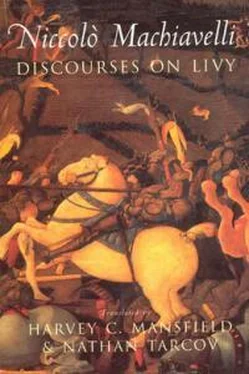Николо Макиавелли - Discourses on Livy
Здесь есть возможность читать онлайн «Николо Макиавелли - Discourses on Livy» весь текст электронной книги совершенно бесплатно (целиком полную версию без сокращений). В некоторых случаях можно слушать аудио, скачать через торрент в формате fb2 и присутствует краткое содержание. Год выпуска: 2014, Издательство: epubBooks Classics, Жанр: История, Философия, на английском языке. Описание произведения, (предисловие) а так же отзывы посетителей доступны на портале библиотеки ЛибКат.
- Название:Discourses on Livy
- Автор:
- Издательство:epubBooks Classics
- Жанр:
- Год:2014
- ISBN:нет данных
- Рейтинг книги:5 / 5. Голосов: 1
-
Избранное:Добавить в избранное
- Отзывы:
-
Ваша оценка:
- 100
- 1
- 2
- 3
- 4
- 5
Discourses on Livy: краткое содержание, описание и аннотация
Предлагаем к чтению аннотацию, описание, краткое содержание или предисловие (зависит от того, что написал сам автор книги «Discourses on Livy»). Если вы не нашли необходимую информацию о книге — напишите в комментариях, мы постараемся отыскать её.
Discourses on Livy — читать онлайн бесплатно полную книгу (весь текст) целиком
Ниже представлен текст книги, разбитый по страницам. Система сохранения места последней прочитанной страницы, позволяет с удобством читать онлайн бесплатно книгу «Discourses on Livy», без необходимости каждый раз заново искать на чём Вы остановились. Поставьте закладку, и сможете в любой момент перейти на страницу, на которой закончили чтение.
Интервал:
Закладка:
Discourses on Livy
The First Decade of Titus Livius
Niccolò Machiavelli
Dedication
To Professor Pasquale Villari
Dear Professor Villari,
Permit me to inscribe your name on a translation of Machiavelli's Discourses which I had your encouragement to undertake, and in which I have done my best to preserve something of the flavour of the original. Yours faithfully,
NINIAN HILL THOMSON.
FLORENCE, May 17, 1883.
Niccolò Machiavelli
To - Zanobi Buondelmonti and Cosimo Rucellai - Health
I send you a gift, which if it answers ill the obligations I owe you, is at any rate the greatest which Niccolò Machiavelli has it in his power to offer. For in it I have expressed whatever I have learned, or have observed for myself during a long experience and constant study of human affairs. And since neither you nor any other can expect more at my hands, you cannot complain if I have not given you more.
You may indeed lament the poverty of my wit, since what I have to say is but poorly said; and tax the weakness of my judgment, which on many points may have erred in its conclusions. But granting all this, I know not which of us is less beholden to the other: I to you, who have forced me to write what of myself I never should have written; or you to me, who have written what can give you no content.
Take this, however, in the spirit in which all that comes from a friend should be taken, in respect whereof we always look more to the intention of the giver than to the quality of the gift. And, believe me, that in one thing only I find satisfaction, namely, in knowing that while in many matters I may have made mistakes, at least I have not been mistaken in choosing you before all others as the persons to whom I dedicate these Discourses; both because I seem to myself, in doing so, to have shown a little gratitude for kindness received, and at the same time to have departed from the hackneyed custom which leads many authors to inscribe their works to some Prince, and blinded by hopes of favour or reward, to praise him as possessed of every virtue; whereas with more reason they might reproach him as contaminated with every shameful vice.
To avoid which error I have chosen, not those who are but those who from their infinite merits deserve to be Princes; not such persons as have it in their power to load me with honours, wealth, and preferment, but such as though they lack the power, have all the will to do so. For men, if they would judge justly, should esteem those who are, and not those whose means enable them to be generous; and in like manner those who know how to govern kingdoms, rather than those who possess the government without such knowledge. For Historians award higher praise to Hiero of Syracuse when in a private station than to Perseus the Macedonian when a King affirming that while the former lacked nothing that a Prince should have save the name, the latter had nothing of the King but the kingdom.
Make the most, therefore, of this good or this evil, as you may esteem it, which you have brought upon yourselves; and should you persist in the mistake of thinking my opinions worthy your attention, I shall not fail to proceed with the rest of the History in the manner promised in my Preface. Farewell .
Book I
Preface
Albeit the jealous temper of mankind, ever more disposed to censure than to praise the work of others, has constantly made the pursuit of new methods and systems no less perilous than the search after unknown lands and seas; nevertheless, prompted by that desire which nature has implanted in me, fearlessly to undertake whatsoever I think offers a common benefit to all, I enter on a path which, being hitherto untrodden by any, though it involve me in trouble and fatigue, may yet win me thanks from those who judge my efforts in a friendly spirit. And although my feeble discernment, my slender experience of current affairs, and imperfect knowledge of ancient events, render these efforts of mine defective and of no great utility, they may at least open the way to some other, who, with better parts and sounder reasoning and judgment, shall carry out my design; whereby, if I gain no credit, at all events I ought to incur no blame.
When I see antiquity held in such reverence, that to omit other instances, the mere fragment of some ancient statue is often bought at a great price, in order that the purchaser may keep it by him to adorn his house, or to have it copied by those who take delight in this art; and how these, again, strive with all their skill to imitate it in their various works; and when, on the other hand, I find those noble labours which history shows to have been wrought on behalf of the monarchies and republics of old times, by kings, captains, citizens, lawgivers, and others who have toiled for the good of their country, rather admired than followed, nay, so absolutely renounced by every one that not a trace of that antique worth is now left among us, I cannot but at once marvel and grieve; at this inconsistency; and all the more because I perceive that, in civil disputes between citizens, and in the bodily disorders into which men fall, recourse is always had to the decisions and remedies, pronounced or prescribed by the ancients.
For the civil law is no more than the opinions delivered by the ancient jurisconsults, which, being reduced to a system, teach the jurisconsults of our own times how to determine; while the healing art is simply the recorded experience of the old physicians, on which our modern physicians found their practice. And yet, in giving laws to a commonwealth, in maintaining States and governing kingdoms, in organizing armies and conducting wars, in dealing with subject nations, and in extending a State's dominions, we find no prince, no republic, no captain, and no citizen who resorts to the example of the ancients.
This I persuade myself is due, not so much to the feebleness to which the present methods of education have brought the world, or to the injury which a pervading apathy has wrought in many provinces and cities of Christendom, as to the want of a right intelligence of History, which renders men incapable in reading it to extract its true meaning or to relish its flavour. Whence it happens that by far the greater number of those who read History, take pleasure in following the variety of incidents which it presents, without a thought to imitate them; judging such imitation to be not only difficult but impossible; as though the heavens, the sun, the elements, and man himself were no longer the same as they formerly were as regards motion, order, and power.
Desiring to rescue men from this error, I have thought fit to note down with respect to all those books of Titus Livius which have escaped the malignity of Time, whatever seems to me essential to a right understanding of ancient and modern affairs; so that any who shall read these remarks of mine, may reap from them that profit for the sake of which a knowledge of History is to be sought. And although the task be arduous, still, with the help of those at whose instance I assumed the burthen, I hope to carry it forward so far, that another shall have no long way to go to bring it to its destination.
Chapter I
Of the Beginnings of Cities in General, and in Particular of That of Rome.
No one who reads how the city of Rome had its beginning, who were its founders, and what its ordinances and laws, will marvel that so much excellence was maintained in it through many ages, or that it grew afterwards to be so great an Empire.
And, first, as touching its origin, I say, that all cities have been founded either by the people of the country in which they stand, or by strangers. Cities have their origins in the former of these two ways when the inhabitants of a country find that they cannot live securely if they live dispersed in many and small societies, each of them unable, whether from its situation or its slender numbers, to stand alone against the attacks of its enemies; on whose approach there is no time left to unite for defence without abandoning many strongholds, and thus becoming an easy prey to the invader. To escape which dangers, whether of their own motion or at the instance of some of greater authority among them, they restrict themselves to dwell together in certain places, which they think will be more convenient to live in and easier to defend.
Читать дальшеИнтервал:
Закладка:
Похожие книги на «Discourses on Livy»
Представляем Вашему вниманию похожие книги на «Discourses on Livy» списком для выбора. Мы отобрали схожую по названию и смыслу литературу в надежде предоставить читателям больше вариантов отыскать новые, интересные, ещё непрочитанные произведения.
Обсуждение, отзывы о книге «Discourses on Livy» и просто собственные мнения читателей. Оставьте ваши комментарии, напишите, что Вы думаете о произведении, его смысле или главных героях. Укажите что конкретно понравилось, а что нет, и почему Вы так считаете.











